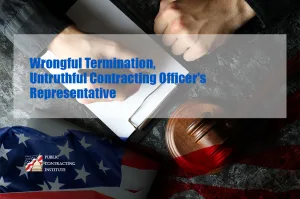The Court of Federal claims recently found the default termination of an Army contract for repair of an Air Force runway to be “improvident” and converted the default to a termination for convenience of the Government. Alutiiq Manufacturing Contractors, LLC v. United States, Fed. Claim No. 15-881C (June 27, 2019). Aside from technical issues with the default, the case is notable for the Court’s calling out an Air Force Colonel, who was the construction manager and Contracting Officer’s Representative (“COR”), for a “history of dishonesty” and his testimony admitting “lying” during this project.

In making the default termination, the contracting officer outlined five acts or omissions that justified his decision:
- Alutiiq’s inability to secure an asphalt subcontractor;
- Personnel gaps in Alutiiq’s management team
- Failure to submit project records and as-built drawings
- Failure to submit routine documents and photos
- “A belief of the onsite government personnel that the project [was] at least 10% behind schedule.”
The Court found that the Government’s termination decision was improper because it could not pass the standard found in Lisbon Contractors, Inc. v. United States, 828 F. 2d 759 (Fed. Cir. 1997). Lisbon held that the government must demonstrate a reasonable belief on the part of the contracting officer that there was no reasonable likelihood that the contractor could perform the entire contract within the time remaining for contract performance. The government cannot satisfy this burden by merely showing that the contractor was behind schedule (which is all they did here).
The most interesting part of the case was the description of the COR’s (Col. Thomas Niichel) history of dishonesty and specific lies. The court quoted one section of the trial transcript with the COR:
(Q) You told him-he asked you specifically if you had contacted that contractor to reaffirm that they had met the spec. right?
(A) Yes sir.
(Q) Your response to him was unequivocal yes, sir, right?
(A) Yes sir.
(Q) That was a lie.
(A) Yes, it was.
The court concluded that the government did not possess adequate grounds to terminate Alutiiq, noting specifically that the Contracting Officer’s reliance on the assertions of the COR (Col. Nichols) was heavily undercut by his history of dishonesty and hostility towards the contractor.
Takaway. The government must satisfy the Lisbon Standard, when terminating for default. Specifically, the government must demonstrate a reasonable belief on the part of the contracting officer that there was no reasonable likelihood that the contractor could perform the entire contract within the time remaining for contract performance. And of course, honesty on the part of contracting officials is required.
For other helpful suggestions on government contracting, visit:
Richard D. Lieberman’s FAR Consulting at https://www.richarddlieberman.com/, and Mistakes in Government Contracting at https://richarddlieberman.wixsite.com/mistakes.

